Stanford University has released the 'AI Index Report 2023,' which reports on the current state of AI, including 'companies are ahead of academia in AI development,' 'AI helps the environment but also harms it,' 'the world's best new scientist is AI,' and 'the number of incidents related to the misuse of AI is rapidly increasing.'

AI-related services such as ChatGPT and Stable Diffusion have emerged from 2022 to 2023, but in addition to the benefits of AI helping people's lives, many disadvantages have been pointed out, such as humans using AI to harm others. Stanford University's AI Research Institute has published a report that collects and analyzes a large amount of data on such AI.
AI Index Report 2023 – Artificial Intelligence Index
The key points of the report are as follows:
01: Companies are ahead of academia
02: Conventional benchmark software cannot measure
03: AI can help and harm the environment
04: Is AI the world's best new scientist?
05: AI misuse cases are on the rise
Demand for AI-related skills is on the rise in nearly every industry sector in the U.S.
07: For the first time in the past decade, private investment in AI has decreased year-on-year
08: The percentage of companies adopting AI will plateau, while companies that do will continue to dominate
09: Policymakers' interest in AI is on the rise
10. Which countries feel most positive about AI products and services?
◆01: Companies are ahead of academia
Until 2014, most of the major machine learning models were published by academic societies, but since then, companies have taken the lead. In 2022, there were 32 important machine learning models published by industry, but only three by academic societies. Building cutting-edge AI systems requires large amounts of data, computers, and funds, but these resources are held in greater quantities by companies than by non-profit organizations and academia.

The total number of publications on AI has more than doubled between 2010 and 2021.

GPT-2, released in 2019, is considered the first large-scale language model, but it has 1.5 billion parameters and cost an estimated $50,000 to train. One large-scale language model,

◆02: Conventional benchmark software cannot measure
Although many AI models have performed well in benchmark tests, the improvement in scores compared to the previous year is small. This indicates that many benchmark software has reached saturation point, and there is a need for new benchmark software to measure the accuracy of models used in AI.
◆03: AI can help and harm the environment
Research suggests that AI systems can have serious environmental impacts: For example, one AI model, BLOOM, when running its training run emits 25 times the amount of carbon dioxide produced by a one-way trip from New York to San Francisco, i.e., traveling from coast to coast across the United States.
The graph below shows the amount of carbon dioxide emitted by each model (unit: tons). While there are concerns about the environmental impact of the models, there are also examples where AI has been found to be able to optimize energy usage, so there is a need for a policy to improve existing systems while taking into account the disadvantages of AI.

◆04: Is AI the world's best new scientist?
AI is rapidly driving scientific progress and has brought various benefits to the scientific community, such as humans successfully generating new antibodies with the help of AI. Microsoft is developing an AI called 'BioGPT' that specializes in the biomedical field, and it is expected that the field will continue to develop.
Microsoft Research develops biomedical AI 'BioGPT' that can answer questions with accuracy comparable to human experts - GIGAZINE

◆05: Cases involving the misuse of AI are on the rise
According to the AIAAIC database, which tracks cases involving the ethical use of AI, the number of cases involving AI has increased 26-fold from 2012 to 2021. High-profile cases in 2022 include a deepfake video of Ukrainian President Volodymyr Zelensky surrendering and a US prison's use of AI call monitoring technology on inmates .

There are also concerns that the results output by AI models may be biased, raising ethical issues. Models that show fair results are not necessarily unbiased, and it has been found that models that perform well in fairness can also produce gender-biased results.
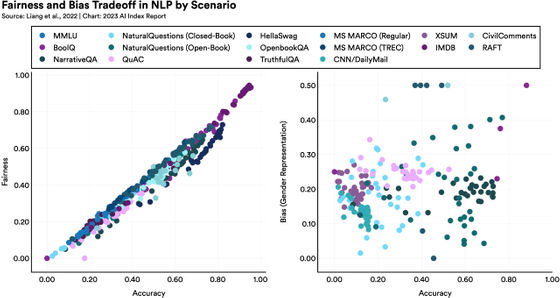
Demand for AI-related skills is on the rise in nearly every industry sector in the US
As many services using AI are being created, an increasing number of companies are introducing AI as an auxiliary tool to improve the efficiency of their everyday work. According to a study by Stanford University, the number of AI-related job openings has increased in almost all industrial sectors for which official data is available. The only industry that saw a 0.02% decrease was the agriculture and hunting sector, but at least in the United States, it can be said that there is a growing trend to seek workers with AI-related skills.
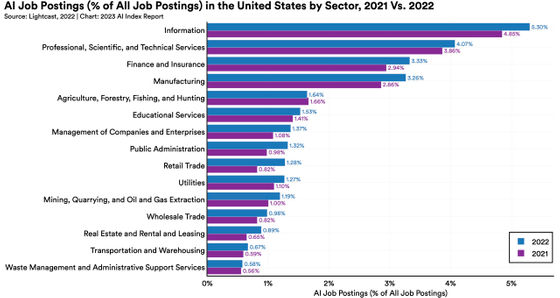
◆07: Private investment in AI declines year-on-year for the first time in the past decade
Global private investment in AI in 2022 totaled $91.9 billion, down 26.7% from 2021. The total number of AI-related fundraising events and the number of AI companies starting to raise funds have similarly declined. However, there is no doubt that investment in AI has increased significantly over the past decade, with private investment in AI being 18 times higher in 2022 than in 2013.
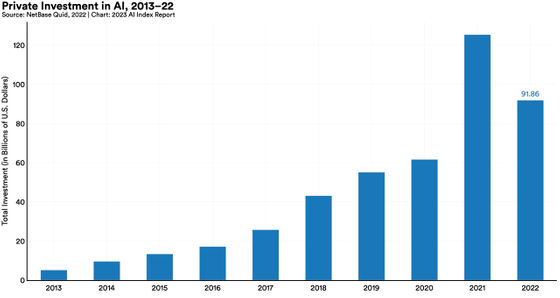
In terms of investment in AI by country, the United States is far ahead with $47.36 billion (approximately 6.22 trillion yen), followed by China with $13.41 billion (approximately 1.76 trillion yen). Among the major countries, Japan is slightly lower at $720 million (approximately 94.5 billion yen).
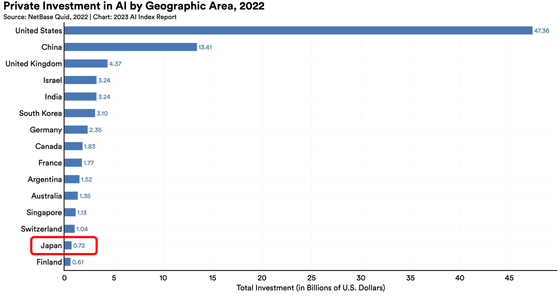
The number of Japanese private companies receiving new investment in 2022 was 32.
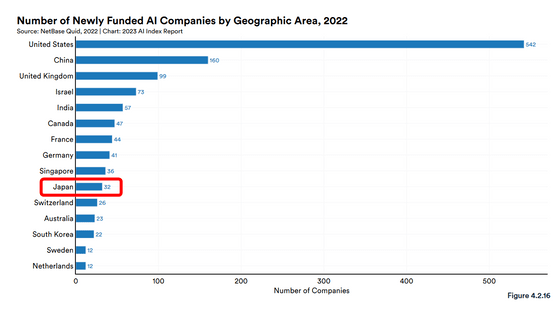
The sector with the most AI-related investment in 2022 was medical and healthcare, followed by data management, processing and cloud, and in third place was finance.
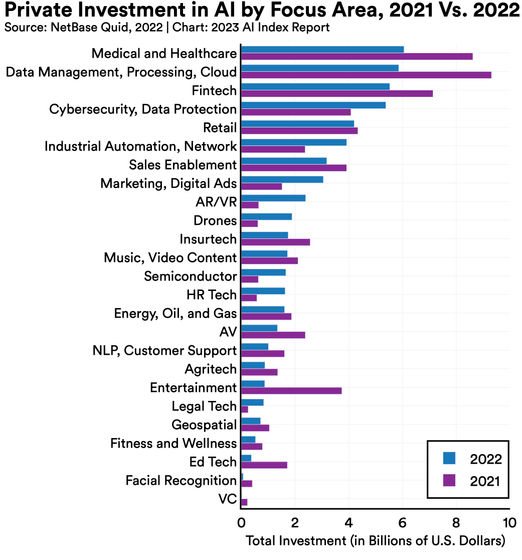
◆08: The percentage of companies adopting AI will plateau, while those that do will continue to have an advantage
According to McKinsey's annual survey results, the percentage of companies adopting AI in 2022 has more than doubled since 2017, but has stagnated at between 50% and 60% in recent years. However, organizations that have adopted AI report realizing meaningful cost savings and revenue increases.
◆09: Policymakers' interest in AI is on the rise
According to a Stanford University analysis of legislative records from 127 countries, the number of AI-related bills that were enacted into law increased from just one in 2016 to 37 in 2022. Similarly, an analysis of parliamentary records on AI from 81 countries found that mentions of AI in global legislative proceedings have increased nearly 6.5 times since 2016. Looking at the seven years from 2016, the UK mentioned AI the most with 1,092 times, followed by Japan with 511 times.
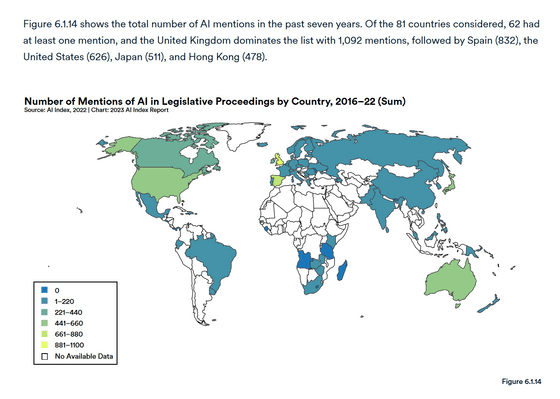
Looking at the number of laws enacted between 2016 and 2022, the United States had the most with two, followed by Portugal with 13, Spain with 10, and Japan with three.
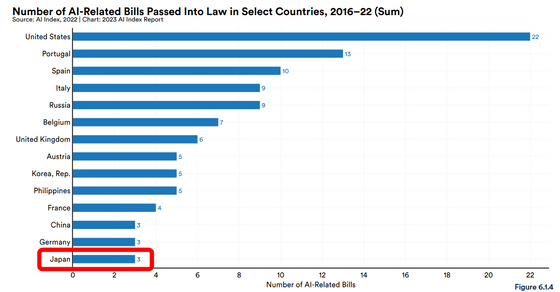
AI-related lawsuits are also on the rise, with a total of 110 lawsuits in the United States alone in 2022. This number is about seven times higher than in 2016.

◆10: Which countries feel most positive about AI products and services?
In a 2022 survey asking about their impressions of products and services that use AI, China was found to have the highest percentage of people who answered that 'there are more advantages than disadvantages.' This was followed by Saudi Arabia and India, and Japan at 42%. The United States, which has the highest investment in AI, was at 35%, suggesting that few people have a good impression of AI.
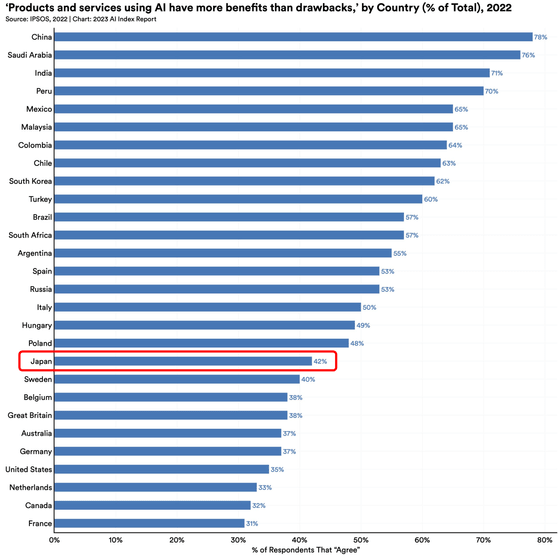
Digging deeper into each question, 41% of Japanese people answered that they 'have a good understanding of what AI is,' while 52% answered that 'AI-based products and services make my life easier.' Other responses are as follows:
・AI-based products and services will significantly change my daily life in the next 3 to 5 years: 53%
・ AI-based products and services have significantly changed my daily life in the past 3 to 5 years: 30%
32% understand what types of products and services use AI
39% trust companies that use AI as much as other companies
・I feel uneasy about products and services that use AI: 20%
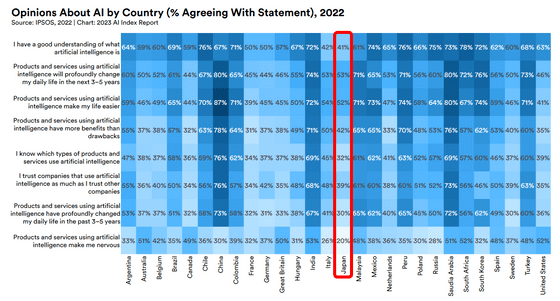
Related Posts:







